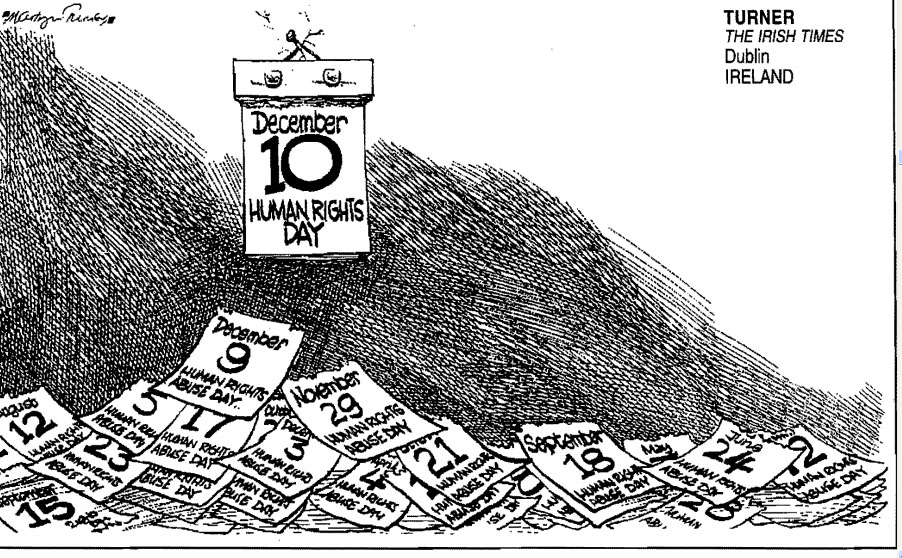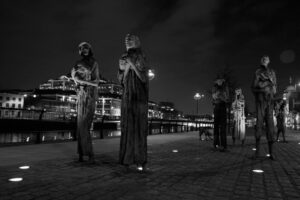
On the 10th of December 1948, the United Nations General Assembly adopted the Universal Declaration of Human Rights (UDHR). It was the first time in history that a document with universal value (it refers to “all members of the human family,” which means all of us) was adopted by an international organisation.
The drafting commission was a suitably diverse bunch, with Eleanor Roosevelt (wife of US President Franklin Delano Roosevelt) chairing, and various members from countries such as Lebanon, China, France, Chile and the Philippines, to mention a few.
UDHR Preamble
The UDHR begins with a preamble. Think of a preamble in terms of a book’s introduction: it explains the Declaration and sets out its underlying values. Rene Cassin, the French member of the drafting commission, compared the Preamble to the steps leading up to a house.
It is a vital part of the UDHR because it places it within a historical context, and explains what it meant to the 48 countries that ratified the document back in 1948 (the UN had 58 members at the time).
Below is the Preamble in full:
Whereas recognition of the inherent dignity and of the equal and inalienable rights of all members of the human family is the foundation of freedom, justice and peace in the world,
Whereas disregard and contempt for human rights have resulted in barbarous acts which have outraged the conscience of mankind, and the advent of a world in which human beings shall enjoy freedom of speech and belief and freedom from fear and want has been proclaimed as the highest aspiration of the common people,
Whereas it is essential, if man is not to be compelled to have recourse, as a last resort, to rebellion against tyranny and oppression, that human rights should be protected by the rule of law,
Whereas it is essential to promote the development of friendly relations between nations,
Whereas the peoples of the United Nations have in the Charter reaffirmed their faith in fundamental human rights, in the dignity and worth of the human person and in the equal rights of men and women and have determined to promote social progress and better standards of life in larger freedom,
Whereas Member States have pledged themselves to achieve, in cooperation with the United Nations, the promotion of universal respect for and observance of human rights and fundamental freedoms,
Whereas common understanding of these rights and freedoms is of the greatest importance for the full realisation of this pledge,
Now, therefore, THE GENERAL ASSEMBLY proclaims this UNIVERSAL DECLARATION OF HUMAN RIGHTS as a common standard of achievement for all peoples and all nations, to the end that every individual and every organ of society, keeping this Declaration constantly in mind, shall strive by teaching and education to promote respect for these rights and freedomsand by progressive measures, national and international, to secure their universal and effective recognition and observance, both among the peoples of Member States themselves and among the peoples of territories under their jurisdiction.
The Universal Declaration of Human Rights
The UDHR contains 30 articles, and covers the most fundamental rights and freedoms of people (collectively and individually) everywhere in the world. The articles can be divided into 6 groups. The Preamble, remember, is like the steps leading to a house.
- Articles 1 and 2 are the foundation blocks on which the UDHR is built. They reaffirm human dignity, equality and brotherhood.
- Articles 3-11 are the house’s first column. They are the rights of the individual: the right to life, outlawing of slavery or torture, equality before the law, the right to a fair trial etc.
- Articles 12-17 are the second column. These are the rights of individuals within civil and political society. They include freedom of movement, the right to a nationality, the right to marry and found a family, as well as the right to own property.
- Articles 18-21 are column number three. They are the spiritual and religious rights of individuals, such as freedom of thought and conscience (i.e. religion), the right to your own opinion, the right to peaceful assembly and association, and the right to vote and take part in government.
- Articles 22-27 are the final column to the UDHR house. They are the social, economic and cultural rights of the individual. They include the right to work, the right to rest and leisure, the right to a decent standard of living, and the right to education.
- The final three articles, 28-30, are the pediment that binds these four columns together. They remind us that rights come with obligations, and that none of the rights mentioned in the UDHR can be used to violate the spirit of the United Nations(Remember: the Preamble, or steps to the house, establishes this spirit).
Explore the online exhibition with 100 objects providing a snapshot of Irish engagement with global cultural, political and social issues over the past 50 years.

Gaza Fishers: An illustrated story by Omar Khouri
As the UN Special Rapporteur on the Right to Food presented his report last year he included illustrated graphic reports by artist Omar Khouri. We share the first of these reports as part of World Food Day 2025, which illustrates the Israeli attacks against Palestinian food sovereignty in Gaza through the story of the Gaza fishers.

Understanding and Exploring Famine in Ireland and Beyond
This learning unit has been developed to support teachers and students in exploring famine in the context of Irish history and beyond

Deniers, Delayers and Regulators, Oh My! Who’s involved in greenwashing?
Who is responsible and who is to blame for practices that can only amount to being called greenwashing? A teachers’ guide by Rachel Elizabeth Kendrick

A teachers’ guide to Greenwashing
A guidebook to support teachers and students in learning about greenwashing as a barrier to sustainable development.

Youth Rising: India’s Vote, India’s Future
Trishla Haryani looks at the 2024 Indian election and the critical role of young people’s vote in shaping it’s political landscape.

Under the Gavel: Are International Courts and Bodies Working?
Daniel McWilliams looks at how the ICC and the ICJ function and any challenges and criticisms faced by them and other international bodies.

